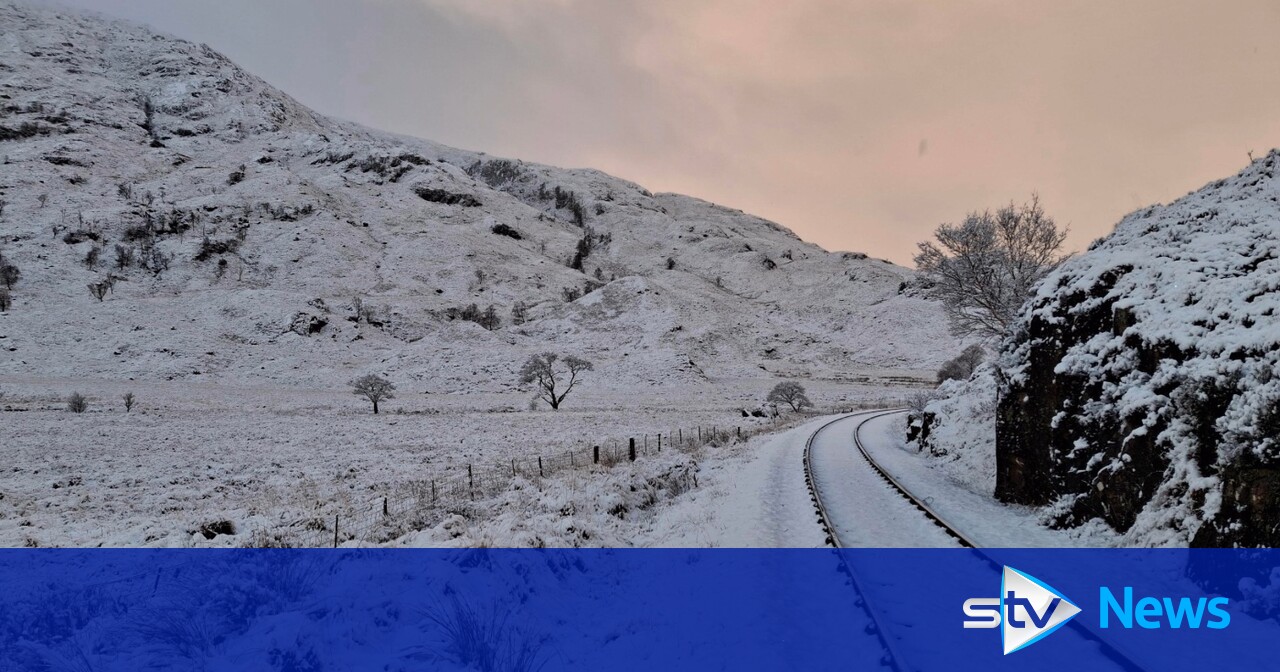Scotland is set to shiver under a blanket of ice this weekend ahead of one of the heaviest snow dumps of the winter so far.
Temperatures are set to plummet to as low as -10c, and Scots setting off to work for the first time this year face a miserable Monday commute as bitter conditions continue into next week.
And along with the freezing cold will be heavy snow, with as much as eight inches of snow on the cards.
The Met Office has issued yellow warnings for ice and snow for most of the country lasting until noon on Monday, while for swathes of England, the alerts have been upped to the more serious amber level.
While Scotland is set to escape the worst of the dumping, those south of the Border have been warned there could be as much as 16 inches of snowfall with icy conditions all around.
The New Year freeze has seen temperatures drop to -6.4c in Dumfriesshire in the early hours of yesterday, but the mercury was expected to plunge to -10C this morning (Sat) with the Arctic breeze continuing into next week.
A yellow warning for ice is in place until 10am today for Scotland, and a yellow alert for snow begins at midnight until midday on Monday amid an expected deluge which threatens to cause transport misery across the county.
With schools back and many set to return to work after the festive holidays, the AA has said it was gearing up for a surge in breakdown calls after the weekend.
Heavy snow has hit the town of Salsburgh, Lanarkshire
Chris Wood, of the motoring organisation, said: ‘The first working day back in January is one of the busiest days of the year for breakdowns, with flat batteries and flat tyres the main culprits.
‘A third of households have more than one car but over Christmas, only one tends to get used for visiting friends and family or to hit the Boxing Day sales.
‘The main commuter car often gets left unused, which means problems go unnoticed until it’s time to head back to work.’
The breakdown firm expects a surge in vehicles not starting, with one in three calls to its hotline expected to be because of this problem.

A car drives through snow in Balerno, near Edinburgh

Team members from Braemar Mountain Rescue assist a group of hillwalkers in difficulty
Transport Scotland said: ‘With so much rainfall, saturated ground and localised flooding in recent days, we would ask the public to remain vigilant.
‘Please plan ahead, check before you travel, drive to the conditions, and allow extra time for your journeys.’
Meanwhile, a team of 25 mountain rescuers were alerted alongside a Coastguard helicopter, to help three hillwalkers in the Cairngorms over night.
The trio had got into difficulty in the wind and snow and raised the alarm just before 10pm on Thursday.
It took nine hours to see them off the hillside safely.

A cat walking in the snow in Lumdsen, Aberdeenshire

A snow plough clears the roads around Alford, Aberdeenshire.
Across the whole of the UK a raft of weather warnings are in place, with the worst affected areas set to be England and Wales where amber alerts for snow and ice are in place from this evening until tomorrow.
There are set to be significant accumulations of snow in parts of Wales, the Midlands and northern England with two inches expected widely and 16 inches over parts of the Pennines.
Meanwhile, a Scotland-wide ice warning is in place until 10am today before a brief respite until tomorrow.
At midnight on Sunday a 36-hour long yellow warning for snow will begin, with the Met Office warning most of Scotland will be affected by traitorous conditions.
Forecasters expect the greatest risk was in southern and eastern Scotland, with around two inches accumulating and as much as eight inches falling over higher ground.
Rain or sleet is more likely near some northern and eastern coasts.
Dan Holley, deputy chief forecaster at the Met Office, said: ‘The system bringing this weekend’s snow will move away to the east by Monday, allowing a cold northerly flow to become established again for much of next week.
‘This will bring further snow showers to northern Scotland in particular, but possible to some other areas, especially near western coasts, with a fair amount of dry and bright weather elsewhere.
‘Temperatures will remain below average, with widespread frost and the risk of ice at times.
‘Some areas, especially in the north, may struggle to get above freezing for several days.’











